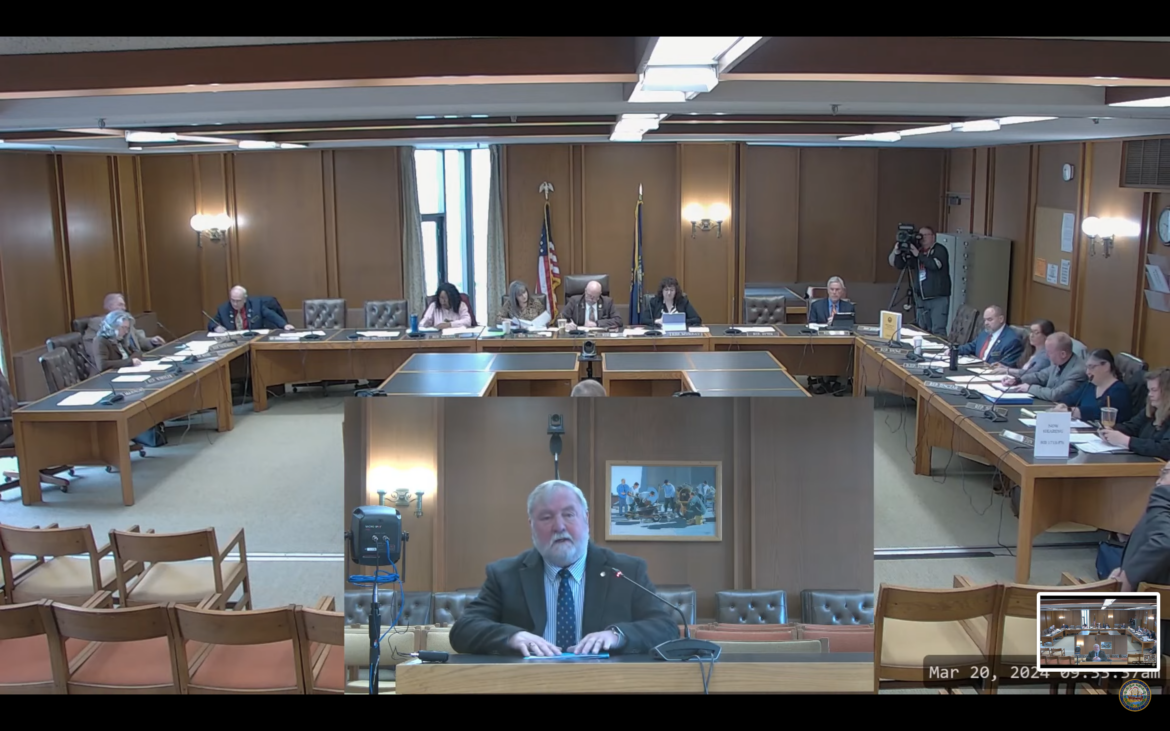
By GARRY RAYNO, InDepthNH.org
CONCORD — Adam Montgomery may have to face the family and loved ones of the daughter he is convicted of murdering if a bill is fast-tracked through the legislature before his May 9 sentencing hearing.
Former House Speaker Steve Shurtleff, D-Penacook, is proposing anyone who commits a class A felony be present through the judicial process as the federal court system requires.
Currently the state has no law or court rules compelling a defendant to be in the courtroom during the judicial process, with the only option a prosecutor filing a motion with the court to compel an appearance leaving the judge to decide as has been done in Montgomery’s case.
Montgomery did not attend the trial and does not intend to appear at the sentencing hearing when Harmony Montgomery’s family and loved ones will be there and are expected to read victim statements.
Montgomery was convicted last month of killing his daughter by beating her in 2019, and moving her body to various locations in Manchester before dumping her remains at an undisclosed location in March 2020.
He was convicted of five charges, including second-degree murder, second-degree assault, witness tampering, falsifying evidence and abuse of a corpse.
The House Criminal Justice and Public Safety Committee met after Wednesday’s public hearing on House Bill 1713 and voted 15-0 to recommend the House pass the bill, although there were several concerns raised by members about aspects of the bill.
One provision requires consecutive sentences if a defendant fails to appear during the court process. Several members of the committee were concerned that it would be possible to convict someone of not appearing, which would be a class A felony under the bill, and the person not convicted of the underlying case, which has to be a class A felony as well.
Does it concern you that someone found not guilty could still be convicted of a class A felony, asked Rep. David Meuse, D-Portsmouth, of Shurtleff, who said not really.
He noted there is a provision in his bill that allows the court to grant an exception if there is a good reason such as to attend a funeral of a family member, or a dying relative.
But in most cases, Shurtleff said, when the defendant does not show up, it is because he or she has taken off. “Not wanting to face the accuser is a separate matter,” he said.
Several committee members asked if there was already some mechanism in place that would compel the defendant to be in the courtroom for the trial and the sentencing.
Rep. Amanda Bouldin, D-Manchester, asked if the defendant could be compelled to appear if the prosecutor files a petition with the court.
Shurtleff said there is no law that says the defendant has to be in court for a judge to base a ruling on, only for humanitarian reasons, but noted it would be up to the judge to decide.
If the judge denies the motion to compel the defendant to attend the sentencing hearing, ‘the victim’s statements will be read to an empty chair at the defense table,” Shurtleff said.
When the prosecutor filed the motion to compel Montgomery to appear at his sentencing hearing, Shurtleff noted, he said Harmony’s family and loved ones will be there and Montgomery should be there to hear his sentence and from the victim’s family, Shurtleff noted.
“Harmony’s loved ones, I believe,” said Shurtleff, “includes all of us in New Hampshire.”
Other concerns were limiting the attendance to the sentencing hearing to allow the family to read victim statements so the defendant knows the impact of his or her actions.
Committee chair Rep. Terry Roy, R-Deerfield, in making a motion that the bill ought to pass, said he believes they should not legislate for a single case, but it is horrific for the family not being able to face the person who committed the crime.
He noted the state has conflicting laws, with the law allowing victims to make statements at the sentencing, and yet not requiring the defendant to be present to hear the statements, which renders them meaningless if the defendant is not there.
“It is imperative to make sure people that commit these crimes face up to what they have done,” Roy said, “not just for the victims, but for the public to see there is a penalty for breaking the law and you have to pay.”
He said there are enough escape valves or mechanisms in the bill to cover the concerns raised by members, and they may prepare floor amendments, but noted they are on a “tight, tight schedule.”
Although committee members raised their concerns again about aspects of the bill, they all said they would vote for it in committee to send it to the House floor with a unanimous vote.
The bill is likely to be on next week’s calendar in order to move it to the Senate for action and on to the governor before Montgomery’s May 9 sentencing.
Garry Rayno may be reached at garry.rayno@yahoo.com. Garry Rayno is InDepthNH.org’s State House bureau chief who has been a reporter in New Hampshire for 40 years.






